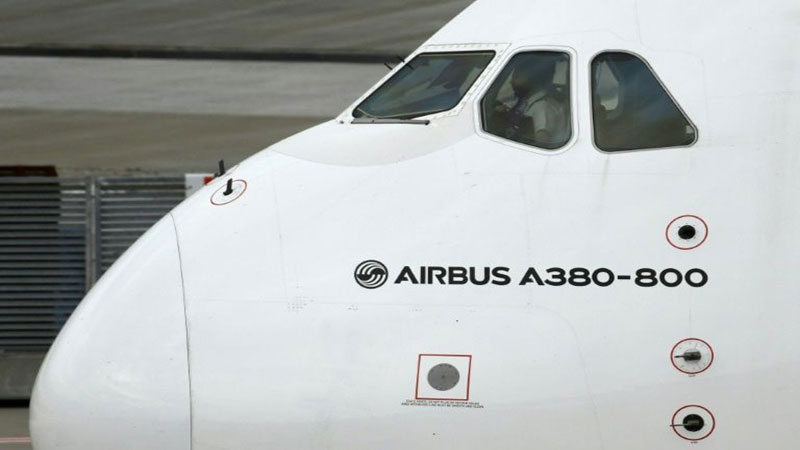Airbus Tariff Dispute: US Airlines To Bear The Cost

Table of Contents
The Origin and Impact of the Airbus Tariffs
The Airbus tariff dispute stems from a long-running World Trade Organization (WTO) case concerning alleged illegal government subsidies provided to both Airbus and Boeing by their respective governments, the EU and the US. The WTO ruled against both parties, finding instances of prohibited subsidies. In response, the US imposed tariffs on various EU goods, including Airbus aircraft and parts. These tariffs, initially implemented in 2019 and repeatedly modified, are causing significant financial strain on US airlines.
The tariffs affect a wide range of Airbus aircraft and parts, impacting both new aircraft acquisitions and ongoing maintenance operations. This translates to:
- Increased costs for spare parts and maintenance: The tariffs make repairs and upkeep of existing Airbus fleets considerably more expensive, impacting operational budgets.
- Higher acquisition costs for new Airbus aircraft: Airlines face significantly inflated prices when purchasing new Airbus planes, impacting capital expenditure and long-term financial planning.
- Potential delays in aircraft deliveries: The complex legal and logistical ramifications of the tariff dispute may lead to unexpected delays in receiving new aircraft, disrupting airline schedules and expansion plans.
- Impact on airline competitiveness: The added costs associated with Airbus aircraft and parts place US airlines at a competitive disadvantage compared to their international counterparts that are not subject to these tariffs.
The EU, in retaliation, imposed its own tariffs on US goods, creating a cycle of escalating trade tensions and further complicating the situation for the global aviation industry.
Financial Strain on US Airlines
The financial implications of the Airbus tariff dispute are substantial for major US airlines. The increased costs associated with acquiring and maintaining Airbus aircraft directly impact profitability. While precise figures are difficult to obtain due to the complex nature of airline finances, analysts estimate that the tariffs are costing US airlines hundreds of millions of dollars annually. This financial strain manifests in several ways:
- Reduced profitability margins: The added expenses significantly reduce the already tight profit margins characteristic of the airline industry.
- Potential for fare increases for passengers: To offset the increased costs, airlines may be forced to raise airfares, impacting consumer affordability and potentially reducing demand.
- Impact on airline expansion plans: The financial burden may force airlines to curtail or postpone expansion plans, including the acquisition of new aircraft and the opening of new routes.
- Increased pressure on operational efficiency: Airlines are under immense pressure to improve operational efficiency and cut costs elsewhere to mitigate the impact of the tariffs.
This situation also raises concerns regarding job security within the industry as airlines struggle to maintain profitability in the face of these unexpected expenses.
Navigating the Challenges: Strategies for US Airlines
Faced with these substantial challenges, US airlines are actively pursuing several strategies to mitigate the negative impacts of the Airbus tariffs:
- Negotiating better contracts with Airbus: Airlines are actively engaging in negotiations with Airbus to secure more favorable contract terms, potentially including price reductions or other concessions.
- Exploring alternative aircraft manufacturers (e.g., Boeing): Some airlines may shift their focus towards Boeing aircraft, reducing their reliance on Airbus and thus avoiding the tariffs.
- Implementing cost-cutting measures across operations: Airlines are implementing various cost-cutting measures, ranging from fuel efficiency improvements to streamlining administrative processes.
- Lobbying efforts to resolve the trade dispute: The airline industry is actively lobbying the US government to negotiate a resolution to the trade dispute and potentially alleviate the burden of the tariffs.
Furthermore, some airlines might employ hedging strategies to manage the risk associated with fluctuating currency exchange rates and potential future tariff adjustments.
The Role of Government Intervention
The US government plays a crucial role in resolving this crisis. Potential policy solutions include:
- Trade negotiations: Direct negotiations with the EU to find a mutually acceptable solution to the trade dispute would be the most effective long-term approach.
- Financial assistance: Government assistance, perhaps in the form of subsidies or tax breaks, could temporarily alleviate the financial burden on US airlines. However, this is a politically sensitive issue with potential implications for fair competition.
Conclusion
The Airbus tariff dispute presents significant challenges for US airlines, leading to increased operating costs, reduced profitability, and potentially higher fares for travelers. The financial strain is substantial and requires multifaceted mitigation strategies from the airlines themselves and potentially decisive action from the US government. The ongoing impact of this Airbus tariff dispute necessitates proactive responses from all stakeholders.
Call to Action: Stay informed on the latest developments in the Airbus tariff dispute to understand its ongoing impact on US airlines and the broader aviation industry. Understanding the intricacies of this ongoing Airbus tariff dispute is crucial for navigating the future of air travel.

Featured Posts
-
 Actress Priscilla Pointer Dead At 100 A Career In Review
May 02, 2025
Actress Priscilla Pointer Dead At 100 A Career In Review
May 02, 2025 -
 How To Unlock All Fortnite Tmnt Skins
May 02, 2025
How To Unlock All Fortnite Tmnt Skins
May 02, 2025 -
 Digital Exclusive Tracking Tulsas Winter Weather With Travis And Stacia
May 02, 2025
Digital Exclusive Tracking Tulsas Winter Weather With Travis And Stacia
May 02, 2025 -
 Kshmyr Jng Awr Amn Ka Tnazeh
May 02, 2025
Kshmyr Jng Awr Amn Ka Tnazeh
May 02, 2025 -
 Improving Workboat Safety And Efficiency Through Automation A Tbs Safety And Nebofleet Partnership
May 02, 2025
Improving Workboat Safety And Efficiency Through Automation A Tbs Safety And Nebofleet Partnership
May 02, 2025
